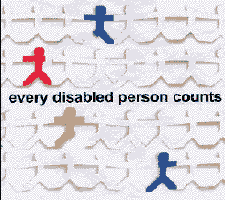 Adil Najam
Adil Najam
Reader Naveed Ejaz recently sent me a link to a new blog he has started called Rethinking Disability. I was finally able to visit and explore the blog today. I was left extremely moved.
The site is exactly correct in pointing out that we, as a society, are caught in “prejudiced molds” of thinking about the disabled. We at ATP also stand guilty of not having raised these issues as we should have (we did do one post on the Pakistan Blind Cricketers Team winning the Blind World Cup; but that is not at all sufficient).
I would particularly recommend a post called The Pink Elephant; but first a bit about Naveed Ejaz – and I reproduce this imply because he has done so on his site and I think it is relevant to understand what he is saying and why:
I am a 25 year old male, born and raised in Pakistan, a developing country by every meaning of the word. Blessed with amazing resources and even greater parents, I have been educated both within Pakistan and abroad. But more importantly for the purposes of this debate, I have cerebral palsy, a physical condition that predominantly affects my mobility, meaning therefore that I am disabled, handicapped, impaired, disadvantaged, invalid and abnormal. Despite the wealth of adjectives at their disposal, my family and friends still prefer to call me by my first name. Some people however insist on calling me by my full name, but I really do not care for that all that much.
The first part of this paragraph provides you context on who the person is. The second half tells you how he thinks. It is the second half, I believe, that is far more relevant.
But even more important than how he thinks, is what he wants us to think about. Here are a few powerful examples; and we would all do well to pay attention:
Imagine the happiest day of your life. For those with an overactive imagination and Freudian tendencies, I urge you to stop here. For many this would bring up images of the day they got married or the birth of a child. Close your eyes and savor and rejoice in the purity of the moment for a while.
Now imagine that your spouse/child is disabled.
The dream ends here; entering unchartered territory that we feel uncomfortable exploring. Herein lies the biggest problem regarding our collective perception of disability. It is a problem that is discussed at an arms length. Much like sexuality, disability is a taboo subject even when considered as part of a serious debate. It is the unnamed pink elephant (for those wondering why pink, kindly refer to a child in the family to tell you the joke) in the living room that no one is comfortable talking about. Being part of the disabled club is then akin to being part of an unwanted minority – a collective being that is considered to be a-religious, a-sexual and non-functional. Discussions regard the role of this minority within society have always been refrained from, primarily for fear of sounding politically incorrect. While the situation is not that pronounced in developed countries – they too have their own problems regarding the subject – where the rights of individuals are stressed upon, it is the third world where conditions are most dire. Unless each and every member of our society warms up to this debate, the situation will continue unabated. For too long now, we have looked for the perfect, politically correct word to describe this group, and in doing so failed to address the core issue at hand i.e. its role.
If that did not catch your attention, then please stop reading; because nothing will.


If it did, then here is some more:
The problem as it exists in the third world today is essentially two pronged in that (i) the society expects the disabled to be less contributing members and (ii) the disabled believe themselves, in some way, to be less contributing members of society.
Simply put, the role of the disabled is no different from the role of those who are healthy. At this point, I must admit to setting up my argument of choice by intentionally using the word healthy as a contrast against disabled, but it is a contrast that is subconsciously accepted to us all. A disability is an aberration, an unwanted trait, a statistical and Darwinian anomaly. Webster dictionary too defines disabled as being ‘incapacitated by illness or injury’; the obvious reference to health. Grammatically, however, disabled – and all other synonymous words – seems to indicate the lack of an ability or skill. The obvious contrast then to health is sickness and for disabled is abled. One is a state of well-being, the other a functional attribute, and while the presence of a disability might give rise to risks in health, accepting the two as contrasting opposites gives rise to problems of repression.
There is a reason why physically handicapped beggars earn more than their able-bodied counterparts in a day. I do not wish to dwell on the socio-economic implications of begging, but merely to illustrate the subconscious pity we have for such individuals which drives us towards greater charity. Pity is possibly the strongest of human emotions, and by indulging in it one subconsciously assumes superiority over the other. It is pity that drives us to assume that the individual cannot achieve much within the limitations the disability imposes. It is pity that projects a feeling of repression on the disabled. It really is a pity that the disabled are faced with not only proving to themselves, but also to society that they are fully functional human beings within their own rights. While collectively, we can do little to alleviate the mental struggles that the disabled are faced with, we can ease the burden by being more accepting and not having them prove their worth time and again. In order to move forward, our acceptance of individuals needs to expand beyond our peripheral senses and into the functional realm.
There is more in the article that is worthy of attention, including the role of culture and religion in cementing stereotypes. But let me leave you only with the authors’ concluding paragraph:
The disabled are here to stay. They have as much right to be part of society as you and I. The sooner we accept the barriers that impede their path, the sooner efforts can be undertaken to remove them. Changing mindsets is the key, both on the collective as well as the individual level. It is essential that we break our minds of our prejudiced molds. It is imperative that the disabled view themselves as functional beings and it is critical that parents do not shy away from seeking professional help for their child. All this is only possible if we all make the conscious effort to think about it.
Regular readers of ATP will recognize why I am so inspired by Naveed and his blog. The key is really – it always is – in whether we (and how we) think about things. It is the matters of the mind that our real challenges lie. The recent silliness of debate on our own blog demonstrates (as if demonstration was necessary) that the real fatoor lies in the minds of men. It is from the same source that the solutions must emerge. Action is always important. Indeed, it is necessary. But just like thought without action will give you mere slogans; action without thought will leave you only with ritual.
So, I for one, pay great heed to Naveed’s words. Think. Think, as if you life depended on it. It may well!



















































Interesting and moving post. It is true that the nation is trapped in a web of stereotypes. I don’t think there is any chance of this changing until some serious effort is undertaken via the media.
Brother Adil thanks that you came with this issue which is very serious and we must pay intention to it.Disabled people are the part of any society in this world,but as we ignore them this is an sad side.this is not only individuals duty but also the duty of Government to take care of them.we need more insititutions and organizations to help them to make useful citizens of pakistan.I saw many beggers those were disabled physicaly but mentaly they were normal,its mean if we have insititutions which give them training and education then i think some of them may come teachers poets and painters.Poverty is also a big issue which make safring disabled people.we must talk more and more to make there voice be heard.By the way i heard that disabled(handicapped)people have the sexual ability but not all even they may have children.May ALLAH protect pakistan and all of you.
I agree that the real challenege is public education. Not of the so-called ‘disabled’ but of the rest of society. Probably one of teh smartest people alive today is Stephen Hawkings. Yet, we keep people with disabilities locked up and hidden as if they wil embarrass the rest of us. The real embarrassment is our own behavior.
This is such a moving and imortant post on a really important issue. So sad that people are just distracted by the silly religious talk elsewhere to ignore the real problems of Pakistan.
disuade –> disSuade